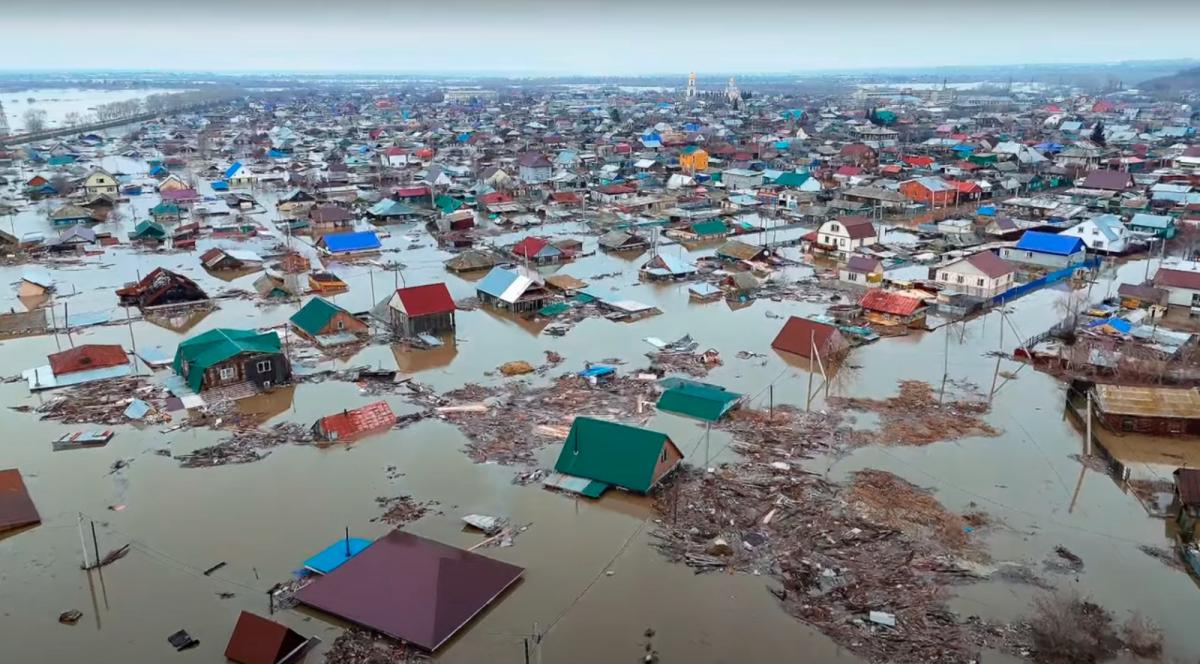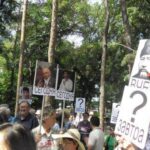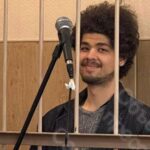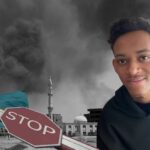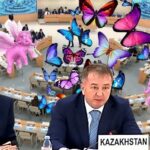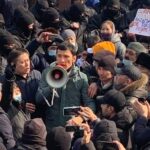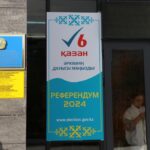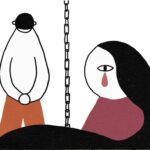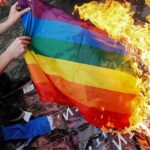This report surveys developments impacting freedom of expression, association and peaceful assembly in Kazakhstan from January to April 2024. It has been prepared by International Partnership for Human Rights (IPHR) and Kazakhstan International Bureau for Human Rights and Rule of Law (KIBHR) in cooperation with the CIVICUS Monitor.
During the reporting period, Kazakhstan experienced the most severe flooding in decades, reinforcing concerns about the impact of climate change in the country. The floods prompted the declaration of a state of emergency in ten of the country’s 17 regions in April 2024 and resulted in widespread destruction, the evacuation of tens of thousands of people, and several deaths. As an example of civil society mobilisation, volunteers played a crucial role in rescue efforts. However, regional authorities faced criticism for their decision to ban journalists from accessing affected areas, which human rights defenders viewed as an unjustified limitation on media operations and the public’s right to information about the unfolding disaster. This decision was particularly troubling given prior criticism of authorities’ inadequate efforts to prevent and respond to the floods. President Kassym-Jomart Tokayev, for his part, attributed blame to government ministers and regional governors, accusing them of negligence, lack of professionalism and poor coordination in handling the situation.
There were also concerning instances of legal action against journalists and social media users in relation to the flooding. Uralsk-based journalist Raul Uporov was fined for “petty hooliganism” after harshly criticising restrictions on media coverage of the flooding, while others faced similar charges for expressing dissenting views on government actions during the crisis. Additionally, there were new cases where journalists and activists were charged with spreading false or defamatory information because of social media posts critical of authorities. For instance, in April 2024, journalist Daniyar Adilbekov was arrested for allegedly falsely implicating a high-level government official in corruption on his Telegram channel.
In April 2024, the lower house of Parliament approved a draft media law and forwarded it to the upper house for consideration. If passed by the upper house, the draft will be sent to the president for signature. While media watchdogs and international experts have welcomed certain aspects of the draft law, such as the shortening of deadlines for state responses to media inquiries and the establishment of a statute of limitations for defamation lawsuits, they have expressed concerns about vague language and deviations from international standards in other provisions. Notably, new provisions, which were introduced prior to the lower house’s final vote, mandate compulsory state registration for both offline and online media. They also grant the government powers to deny accreditation to foreign media outlets and journalists “in accordance with national legislation”. The introduction of these provisions coincided with difficulties faced by over 30 correspondents from Radio Free Europe/Radio Liberty’s local service in obtaining accreditation. However, following a legal complaint, the service reached an agreement with the Foreign Ministry in April 2024, ensuring the accreditation of its journalists.
Shortly before the lower house voted on the draft media law, MPs from the ruling Amanat party proposed controversial amendments regarding so-called propaganda of non-traditional sexual relations. However, in a welcome development, these provisions were not included in the approved version. Despite this, concerns persist regarding efforts to curtail freedom of expression under the guise of preserving traditional values. In a notable example from February 2024, the government blocked a website aimed at informing young people about LGBTQI+ issues, citing the protection of national traditions and children’s rights as justification for the move.
The high-profile trial of former Minister of Economy Kuandyk Bishimbayev, who stood accused of fatally beating his wife, attracted significant attention in Kazakhstan during the reporting period. The live-streamed court proceedings, which began in March 2024 and concluded with Bishimbayev’s conviction in May 2024, highlighted the pervasive problem of domestic violence in the country. In response, tens of thousands of individuals signed a petition calling for harsher penalties against such violence. Responding to the public outcry, lawmakers swiftly enacted new legislation, re-establishing criminal sanctions for battery and enhancing protections for domestic violence victims. While human rights groups welcomed this legislative progress as a significant step forward, they emphasised the need for comprehensive measures to prevent and eradicate domestic violence.
At the same time, there were new cases of pressure against independent women’s rights advocates. Feminist activists in Almaty were denied the right to rally peacefully and march in support of women’s rights on International Women’s Day on 8th March 2024. This refusal was justified with the alleged risk of disruptions to public order. Furthermore, prominent women’s rights activist Dina Smailova, founder of an organisation assisting victims of domestic and sexual violence, faced criminal charges, prompting concerns that she was being targeted in retaliation for her work. Previously forced to flee Kazakhstan due to the threat of prosecution, Smailova is now subject to an international arrest warrant.
Two years after the “Bloody January” events of 2022, when authorities forcefully suppressed mass protests and unrest, concerns persist regarding the adequacy of the government’s efforts to ensure accountability for serious human rights violations committed. During the reporting period, several law enforcement officials were convicted for abusive actions during the January events. For instance, in March 2024, a court in Taldykorgan sentenced three ex-police officers to prison and one officer to a non-custodial sentence for torturing seven individuals, including using an iron. In other cases, appeal courts overturned earlier verdicts, resulting in harsher penalties. Notably, two police officers accused of torturing a protester who died in detention in Semey had their suspended prison sentences converted into actual prison terms, and a soldier previously acquitted was imprisoned over his role in the death of a four-year-old girl who was killed when her family’s car was fired on in Almaty. Meanwhile, other cases were still under investigation, such as that of a well-known jazz musician from Kyrgyzstan who was detained and tortured, despite not participating in the January 2022 protests. Following a two-year investigation, the first suspects were arrested in this case in April 2024.
While it is welcome that these and other officials have been criminally charged for abuses related to the January 2022 events, the overall number of officials prosecuted remains low in relation to the scale of reported violations. Moreover, fair trial and due process violations have tainted proceedings, and the sentences issued have often not corresponded to the severity of the crimes. There are also ongoing concerns about the fairness of legal proceedings initiated against protesters and activists accused of unlawful actions during the January events.
At least two authors who independently assessed the January 2022 events encountered difficulties in disseminating their books. This reinforced concerns about the government’s reluctance to permit transparent investigations into this crisis.
During the reporting period, political opposition groups and activists encountered ongoing obstruction and harassment. The Alga Kazakhstan! opposition party, for instance, faced persistent hurdles in obtaining registration. The party filed an application for registration for the 24th time in April 2024, with previous requests all having been rejected due to purported problems with its lists of supporters. Furthermore, party activists were detained and penalised during protests, and at least two were convicted for involvement in an unregistered organisation. Similarly, activists from the unregistered Atajurt movement, which advocates for the rights of ethnic Kazakhs in China’s Xinjiang region, were fined for allegedly funding an unregistered organisation through small donations to the movement.
The misuse of criminal charges of “extremism” against government opponents continued during the reporting period. Marat Zhylanbaev, leader of Alga Kazakhstan!, remained incarcerated following his conviction on spurious charges of participating in a banned extremist organisation and financing extremist activities in November 2023. Despite calls from human rights groups and the international community for his immediate release, his conviction was upheld on appeal in January 2024. Journalist-blogger-activist Duman Mukhamedkarim went on trial on similar charges in February 2024, with proceedings still ongoing as of the beginning of May 2024. Both Zhylanbaev’s appeal hearing and Mukhamedkarim’s trial were conducted behind closed doors, leading the activists to hold hunger strikes in protest. Additionally, reports emerged that Zhylanbaev was placed in solitary confinement for his hunger strike, while Mukhamedkarim alleged mistreatment during his transfer to court from detention.
Between February and April 2024, Kazakhstani authorities arrested three Kazakhstan-based activists from Uzbekistan’s autonomous Karakalpakstan republic, in response to requests from their Uzbekistani counterparts. The activists: Akylbek Muratbai, Rasul Zhumaniyazov and Rinat Utambetov, are at risk of forcible return to Uzbekistan, where they could face torture and politically-motivated imprisonment because of their peaceful efforts to raise awareness about the situation in Karakalpakstan and to demand accountability for the Uzbekistani government’s forceful dispersal of mass protests there. As of the beginning of May 2024, the three activists remained in detention in Kazakhstan pending further investigation. They have all applied for asylum in Kazakhstan.
Throughout the reporting period, local authorities persistently violated the right to freedom of peaceful assembly. They routinely denied permission for peaceful gatherings and arbitrarily detained and penalised protesters before, during and after unauthorised assemblies. Additionally, authorities targeted individuals gathering for reasons unrelated to protest, such as showing support for activists on trial, facilitating the submission of a new registration application by the Alga Kazakhstan! opposition movement, or paying tribute to slain Russian opposition figure Aleksey Navalny. In a particularly egregious incident, a group of relatives seeking to convey concerns about the lack of justice for loved ones who died during the January 2022 events were rounded up and fined in the capital, Astana, while attempting to meet with President Tokayev.
These and additional developments during the reporting period are covered in more detail below.
EXPRESSION
Media law progresses
On 17th April 2024, Kazakhstan’s lower house (Mazhilis) passed a draft media law on second reading, whereafter it was submitted to the upper house (Senate) for consideration. If approved by the upper house, the law will be sent to the president for signature.
Both representatives of the media community and international experts have raised concerns about the draft media law. An expert analysis by the OSCE Representative on Freedom of the Media, which was published in October 2023, welcomed some provisions of the draft law, such as a definition and ban on censorship, shortened deadlines for state bodies to respond to requests for information from media and journalists, and the establishment of a statute of limitations for defamation lawsuits relating to journalistic materials. However, the OSCE experts criticised other aspects of the draft law, such as the lack of clear definitions of key concepts, vaguely worded restrictions on media content, the failure to adequately account for the differences between different types of media outlets in the regulation of media operations, and the lack of sufficient guarantees against arbitrary decisions to restrict or suspend the activities of media.
In addition, in January 2024, new problematic provisions were added to the draft law, including a requirement for online media to undergo compulsory state registration, and provisions granting the government broad powers to deny accreditation to foreign media outlets and their reporters on the grounds of national security, as well as to suspend the activities of such outlets without a court decision.
The International Press Institute (IPI) stated at the time: “We are particularly concerned by the introduction of vague ‘national security’ rules and new accreditation rules that, together, risk seeing foreign correspondents prevented from working in Kazakhstan in an arbitrary manner or retaliated against for their critical journalism.” These concerns were reinforced by the fact that the proposed amendments were put forward at a time when the local RFE/RL service, Radio Azattyq was facing difficulties with obtaining and extending accreditation for its journalists (see more below).
difficulties with obtaining and extending accreditation for its journalists (see more below).
The version of the media law approved by the lower house of parliament in April 2024 featured the new provisions on compulsory state registration for online media in the proposed format. However, the provisions on the grounds for denying accreditation to foreign outlets and journalists were differently and more broadly worded than initially proposed, stating that the Ministry of Justice may reject requests for accreditation “in accordance with the legislation of the Republic of Kazakhstan”, leaving it open how they will be implemented. Journalists will not be allowed to work without accreditation.
In a welcome development, the version passed by the lower house did not include controversial amendments regarding propaganda of so-called non-traditional sexual relations, which MPs from the ruling Amanat party proposed shortly before the vote. These provisions would have allowed for suspending the operations of media outlets found to engage in LGBTQI+ propaganda and established criminal responsibility for such propaganda. Provisions on the introduction of press cards for journalists were also dropped.
According to the latest approved draft, from 2025, at least 55 percent of all TV and radio programmes broadcast in the country should be in Kazakh and nationally produced. As of 2027, this percentage will be increased to 60.
RFE/RL journalists face difficulties obtaining accreditation
In January 2024, local RFE/RL service Radio Azattyq learned that the Foreign Ministry had refused to grant or extend accreditation to more than 30 of its correspondents. The Ministry claimed that the journalists had violated national law by working while their applications were pending. However, Radio Azattyq stated that the applications for accreditation had been filed on time, but that the Ministry had failed to consider them within the required two-month period, and that some of its journalists had been waiting for accreditation since late 2022. The service filed a complaint with court, and on 23rd April 2024, it was reported that RFE/RL had reached an agreement with the Foreign Ministry, allowing its journalists to receive accreditation. The details of the agreement were not made public, but RFE/RL President Stephen Capus stated: “Throughout this process, all we have wanted was for our journalists to be able to continue their vital work in Kazakhstan safely, without compromise. We remain committed to serving our audiences with independent, trusted reporting and I am confident that this agreement will enable us to do just that.”
As Kazakhstan was hit by the worst flooding in decades in March-April 2024, with a state of emergency declared in 10 out of 17 regions, there were concerns about official attempts to restrict media coverage of the disaster. For example, on 21st April 2024, the Department for Emergency Situations of West Kazakhstan announced that media representatives would be prohibited from accessing the areas affected by the flooding for the duration of the emergency, justifying this decision with the need to ensure the safety of journalists. However, human rights defenders deemed the decision unlawful. For example, the Adil Soz Foundation for the protection of free speech criticised it for imposing excessive restrictions on the operation of media and the public’s access to information, in violation of national law. The organisation stressed that journalists play a crucial role in informing the public about the flooding and alerting them to potential threats.
At least one journalist was penalised for criticising the restrictions on media coverage of the flooding. Thus, on 30th April 2024, a local court in the city of Uralsk convicted journalist Raul Uporov, who works with an independent media project, of “petty hooliganism” (under Article 434 of the Code on Administrative Offences) in relation to an Instagram story in which he commented on the ban on journalists’ access to affected areas. In the story, he criticised this ban as unlawful and stated that “real journalists should work where their presence is needed,” adding that he personally doesn’t “give a f**k about such orders”. The court concluded that Uporov had committed “petty hooliganism” by publicly using obscene language and fined him an equivalent of EUR 175.
Several media users were also convicted under the same provision of the Code on Administrative Offences, which penalises the public use of obscene language and other actions deemed to disturb public order, because of their criticism of the government’s response to the floods. Akylbek Temirgalinov, a resident of the city of Aksu in Pavlodar region, was detained for six days on such charges after posting a critical Facebook post, in which he used a swear word to refer to the situation caused by the floods. Another Kostanay-based social media user, Kayrat Musabaev was sentenced to 10 days’ detention because of a video in which he expressed his indignation with the president and his government in this context. He stated: “It was you who allowed this to happen,” recalling that people had lost their homes and property and that some had even died due to the floods.
Misuse of legislation prohibiting the spread of “false” information and defamation
There has recently been an increase in the number of cases in which journalists, bloggers and activists have been accused of disseminating false, defamatory and offensive information, with charges initiated against them under relevant provisions of administrative and criminal law. These cases give rise to concerns about the misuse of such charges to stifle legitimate free speech. These are examples from the reporting period:
- In early April 2024, police in Astana confirmed the arrest of journalist Daniyar Adilbekov on charges of false denunciation (Criminal Code article 419). Later the charges were reclassified as “knowingly spreading false information” (Criminal Code article 274). Adilbekov is accused of falsely implicating a high-level government official in corruption on the Dikaya Orda Telegram channel, which he runs. In a joint appeal issued on 3rd May, World Press Freedom Day, more than a dozen of Adilbekov’s journalist colleagues called for his release.
- Journalist Jamilya Maricheva from the ProTenge project, which investigates government procurement and tenders, was detained by police in Almaty on 24th April 2024. She was held for about an hour and informed that a case had been opened against her on charges of “spreading false information”, an offence punishable under a new provision (article 456-2) introduced to the Code of Administrative Offences in autumn 2023. The charges concerned a Telegram post commenting on the denial of accreditation to RFE/RL journalists (see above), which allegedly distorted the grounds for this decision. On 13th May 2024, a local court convicted Maricheva on these charges, fining her around EUR 150. Another journalist, Askhat Niyazov faced charges of defamation (under article 73-3 of the Code on Administrative Offences) for reposting the ProTenge post. However, on 29th April 2024, a local court dismissed the case against him.
- On 12th February 2024, Shymkent City Court convicted journalist Marina Nizovkina of defamation (article 73-3 of the Code on Administrative Offences), fining her an equivalent of about EUR 1300. The court thereby overturned the ruling of a lower-level court, which had ordered the closure of the case. The charges against the journalist concerned two Instagram posts, which an official from Shymkent Police Department considered offensive. The posts referred to allegations that the police official’s car had been confiscated because of the use of false licence plates. The Adil Soz Foundation for the Protection of Free Speech concluded that there was no element of defamation in the journalist’s posts.
- On 16th January 2024, a local court in Petropavlovsk sentenced activist Vadim Kuramshin to 20 days’ detention for disseminating false information (article 456-2 of the Code of Administrative Offences). The charges concerned a Facebook post, in which Kuramshin criticised the conditions in the prison where he was held when serving an earlier sentence considered politically motivated by human rights defenders.
Obstruction of the dissemination of books about the January 2022 events
During the reporting period, KIBHR documented two cases in which the authors of books about the January 2022 events faced difficulties in relation to the publication and dissemination of their works. In January 2024, a printing house in Almaty refused to continue cooperation with journalist Daniyr Moldabekov on his book about these events following a raid by law enforcement officials. Other printing houses also rejected requests to print the book, which features on-the-ground reporting from the days of the protests as well as from subsequent trials.
In another case, well-known sociologist Gulmira Ileuova reported that book stores in Almaty had refused to sell her book about the January 2022 events, published by the Center for Social and Political Research “Strategy”. This is also believed to have been the result of pressure by authorities.
While these critical assessments of the January 2022 events were obstructed from being published, books supportive of the official accounts of these events – such as a recent book by Russian publicist Leonid Mlechin – are widely available in Kazakhstan.
Blocking of LGBTQI+ site and proposal to ban TikTok
In a development giving rise to concerns about violations of freedom of expression on the internet, in February 2024, the Ministry of Culture and Information blocked a website set up to inform young people about LGBTQI+ issues. The Ministry argued that this move was aimed at protecting children’s rights and national traditions. The site in question, Selftanu.kz, had been launched as late as January 2024, and featured information in Kazakh and Russian about health, relationships and sexual orientation for young people. At the time of writing, the site remains blocked.
Further, in April 2024, Minister of Culture Aida Balaeva stated that Kazakhstan should consider the possibility of blocking access to TikTok. Her statement came shortly after neighbouring Kyrgyzstan moved to block the popular platform, arguing that this was necessary to protect children against “harmful information”. Complete bans of social media platforms are problematic under international human rights standards. For example, the UN Human Rights Committee has stated that generic bans on the operation of websites are generally impermissible, and that any restrictions imposed should be content-specific and meet the strict requirements of lawfulness, necessity and proportionality set out by the International Covenant on Civil and Political Rights.
ASSOCIATION
Persecution of opposition groups and activists
No genuine opposition party has been able to register in Kazakhstan despite the political modernisation drive initiated by President Tokayev after the January 2022 events. In particular, the opposition party Alga Kazakhstan! (“Forward Kazakhstan!”) has repeatedly had its application for registration returned because of alleged inconsistencies with technical registration requirements. The authorities have argued that the initiators failed to provide proof of a sufficient number of supporters, although they have collected signatures from many more people than required and provided video confirmations of support from signatories. In late April 2024, Alga Kazakhstan! filed its application for registration for the 24th time.
Alga Kazakhstan! members have been subjected to intimidation and harassment by law enforcement authorities including by being summoned and questioned about their involvement in the organisation and detained and penalised when peacefully gathering (for examples, see Peaceful Assembly). During the reporting period, several Alga Kazakhstan! activists were penalised under a provision of the Code of Administrative Offences (article 489), which prohibits participation in the activities of unregistered organisations. Local courts applied this provision, although the registration attempts of the party are still underway. Thus, Sergey Ismailov from the city of Petropavlovsk was fined around EUR 450, and Alina Smakovaya from the city of Kostanay was ordered to serve 10 days in detention.
The leader of Alga Kazakhstan! remained imprisoned:
- As reported before, following a trial closed to the public in November 2023, a local Astana court sentenced Marat Zhylanbaev to seven years in prison on charges of involvement in a banned extremist organisation and financing of extremist activities (under articles 405 and 258 of the Criminal Code). The court also banned him from engaging in public and political activities for three years. Zhylanbaev was accused of involvement in “extremist” activities because of his alleged contacts with activists from the Democratic Choice of Kazakhstan (known as DVK), an opposition movement banned as “extremist” in 2018 despite its non-violent nature. Available case materials show that the charges levelled against Zhylanbaev lack a substantial basis and that he was held accountable for activities that constitute legitimate exercise of the freedoms of expression, association and assembly, such as participation in group chats, social media posts and peaceful protests, and have nothing to do with violent extremism. In a joint statement, IPHR and KIBHR said that his conviction was “a shocking illustration of the Kazakhstani authorities’ lack of commitment to genuine democratic reform” and was “intended as a warning to other vocal government critics”. They called for his immediate and unconditional release – a call also made by other NGOs, as well as representatives of the international community. However, on 19th January 2024, Astana City Court rejected Zhylanbaev’s appeal against his conviction and upheld his sentence unchanged. According to Zhylanbaev’s lawyer, the activist was placed in solitary confinement after launching a hunger strike to protest against the non-public nature of the appeal hearing. Zhylanbaev also reported being treated worse than co-detainees, in particular by only being allowed to use cold water when showering. An appeal to the Supreme Court is pending in Zhylanbaev’s case.
As covered in the previous update, the Atajurt organisation, which defends the rights of ethnic Kazakhs living in China’s Xinjiang region, was also denied registration because of alleged problems with the list of supporters provided, and its activists have been subjected to pressure. During the reporting period, activists Seitmukhamed Shezhimbekuly and Kapar Akhmet were both fined around EUR 800 for allegedly funding an unregistered organisation (an offence also punishable under article 489 of the Code on Administrative Offences) because of small financial contributions to support the organisation.
The authorities continued to prosecute activists accused of having links to the DVK or the Street Party (Koshe Partiyasy), another group which has been banned as “extremist” by court despite its non-violent nature. These are two high-profile cases from the reporting period:
- Duman Mukhamedkarim, journalist, YouTube blogger and opposition activist known for his criticism of the authorities, went on trial in the city of Qonaev in mid-February 2024. The trial is being held behind closed doors. As reported in the previous update, Mukhamedkarim was arrested in July 2023 and remanded to pre-trial detention on charges of financing extremist activities and participating in the activities of a banned extremist organisation (under articles 258 and 405 of the Criminal Code). These charges relate to a live broadcast he aired in December 2022 together with DVK founder Mukhtar Ablyazov. According to the investigation, Mukhamedkarim published information about how to make donations to the DVK and expressed support for the organisation’s programme. His arrest occurred on the day he was due to be released after serving a sentence of administrative detention for allegedly violating the rules for holding peaceful assemblies. Mukhamedkarim has repeatedly been subjected to administrative detention after announcing his intentions to hold peaceful protests without prior permission from the authorities.
Kazakhstani human rights defenders have recognised Mukhamedkarim as a political prisoner and, among others, Human Rights Watch has called for his release.
At the time of writing, Mukhamedkarim’s trial is still under way. After the trial began, he held a hunger strike to protest against the court’s decision to close the proceedings to the public. He reported being subjected to ill-treatment while being transferred to court from the pre-trial detention facility, with an investigation into his complaint being opened. If found guilty on the charges against him, Mukhamedkarim could face a lengthy prison sentence.
- As reported before, a few days before the early presidential elections held on 20th November 2022, security services claimed to have foiled the activities of a group planning to organise riots with the aim of seizing power on election day. During a special security operation, seven alleged members of this group were detained. According to the security services, those apprehended were members of the DVK and the Street Party and “sympathised with” and “held similar views” to DVK founder Mukhtar Ablyazov. On 9th March 2024, an Almaty court convicted six defendants to prison terms of five to six years on charges of publicly calling for the violent seizure of power, involvement in an “extremist” group, organisation of riots and other charges. They all maintained their innocence. However, one defendant, who reportedly confessed during the investigation and testified against the others, was given a suspended three-year sentence.
Lawyers for the defendants, as well as observers monitoring the proceedings concluded that the authorities failed to present any convincing evidence of the defendants’ guilt, with the charges relying primarily on witness statements, testimonies from the defendant who “confessed” and secret recordings of the defendants’ conversations, as well as a so-called potato cannon that they were found to have prepared. Human rights defenders have deemed the case politically motivated and recognised the defendants as political prisoners.
Those convicted in this case include, among others, Akylzhan Kiysymbaev, a civil society activist who was detained, injured, and allegedly subjected to torture in connection with the January 2022 events. He has since participated in a series of peaceful protests demanding accountability for law enforcement officials who forcibly put down protests and tortured detainees.
Women’s rights activist targeted
In early January 2024, well-known women’s rights activist Dinara Smailova (also known as Dina Tansari) published an appeal to President Tokayev regarding criminal charges of fraud initiated against her. At the end of December 2023, Kazakhstani authorities issued an international arrest warrant for Smailova, who fled Kazakhstan in 2021 and since then has been based abroad, on these charges. The accounts of her organisation Ne Molchi (“Don’t be quiet”) were also frozen. Previously hundreds of people who had donated money to her organisation had reportedly been summoned and requested to write complaints stating that Smailova had used money for personal needs. The activist described the fraud charges against her as unfounded and politically motivated, saying they were based solely on six alleged, similar-looking complaints from people who donated money to her organisation and concerned a total amount of approximately EUR 35. She stated that she had not received any official notification about the charges against her nor been given any opportunity to defend herself.
According to the Ministry of Interior, six criminal cases have been opened against Smailova. Prior to facing fraud charges, she was accused of posting incorrect information about allegations of sexual violence and violating the right to privacy because of a social media post about the rape of a young girl. If found guilty of the different charges she is facing, she could face a lengthy prison sentence.
Smailova founded Ne Molchi in 2016 to assist victims of domestic and sexual violence and promote public awareness-raising in this area. She has spoken out on issues concerning gender-based violence and the work of her organisation has resulted in dozens of perpetrators being held accountable for sexual violence and dozens of law enforcement officers being convicted for neglect and inaction.
When first facing the threat of criminal prosecution in 2021, she left Kazakhstan for Georgia and re-registered her organisation there. However, in what Smailova believes was the result of pressure from Kazakhstani authorities, she was denied re-entry to Georgia in October 2023 after visiting Turkey. She has now applied for asylum in an EU country.
Human rights defenders raised concerns about the criminal prosecution of Smailova. Human Rights Watch stated: “The authorities’ spirited efforts against Smailova look more like an attempt to discredit her organisation’s legitimate work, than a move to root out criminal activity”, noting that the case against her “lacks credible evidence of any alleged wrongdoing” and that her lawyers have reported “multiple procedural violations” during the investigation. Human Rights Watch called on the authorities to “ensure that the criminal justice system is not being manipulated and weaponized to silence an outspoken activist and critic”.
Karakalpak activists at risk of refoulement
During the reporting period, several Kazakhstan-based activists originating from Uzbekistan’s autonomous Karakalpakstan republic were arrested by Kazakhstani authorities at the initiative of their Uzbekistani counterparts. These activists face the threat of forcible return to Uzbekistan, where they would be at serious risk of torture and ill-treatment, as well as politically motivated arrest and imprisonment in retaliation for their peaceful attempts to draw attention to the situation in Karakalpakstan, to defend the rights of its people and demand accountability for the government’s forceful dispersal of mass protests held in the republic in July 2022. Thus, their return would be in violation of the non-refoulement principle set out by international law.
- Akylbek Muratbai, a well-known Karakalpak activist, was arrested by police in his home in Almaty on 15th February 2024. His arrest was based on unfounded charges of publicly calling for riots and threatening public order initiated against him by Uzbekistani authorities in relation to the July 2022 mass protests against proposed constitutional amendments in Karakalpakstan. The charges concern videos posted by the activist as part of his engagement in support of justice and respect for the rights of the people of Karakalpakstan. A local Kazakhstani court sanctioned Muratbai’s detention for 40 days, a period that was later extended for up to a year, while his possible extradition to Uzbekistan is considered.
Muratbai, who has lived in Kazakhstan for more than 10 years, applied for asylum in Kazakhstan following his detention and was granted the status of asylum seeker until 23rd May 2024 (with the possibility of extension).
Muratbai has previously faced intimidation because of his activism. In October 2023, Uzbekistan’s Consulate General in Almaty warned him to “soften the tone” when speaking about human rights issues in Karakalpakstan. His relatives living in Uzbekistan have also received threats.
- Further, in March-April 2024, two other Kazakhstan-based activists from Karakalpakstan were also detained by Kazakhstani authorities. The first of these activists, Rasul Zhumaniyazov was arrested in Astana on 26th March 2024. Zhumaniyazov had previously reported being threatened by Uzbekistani security officers, who warned him that he would be declared wanted unless he returned to Uzbekistan voluntarily. A member of the Alga Karakalpakstan movement, he has actively spoken out about the situation in the autonomous republic, demanding accountability for those involved in killing protesters during the July 2022 events. According to available information, Zhumaniyazov – who has lived in Kazakhstan since 2021 – was planning to apply to prolong his legal residency in the country at the time of his arrest. Another activist, Rinat Utambetov was arrested in Almaty region in early April 2024 at the request of Uzbekistani authorities, who have accused him of “encroaching the constitutional order” because of a video appeal he published regarding the suppression of the July 2022 protests in Karakalpakstan. Utambetov has a residence permit for Kazakhstan. At the time of writing, he remains in detention. Both Zhumaniyazov and Utambetov have applied for asylum in Kazakhstan.
Muratbai, Zhumaniyazov and Utambetov are not the first Karakalpak activists to have been targeted by the Kazakhstani authorities. Five others were arrested in September-November 2022 and held for a year before being released. The Uzbekistani authorities had requested their return on charges of encroaching on the constitutional order. While they were not extradited to Uzbekistan, neither were they granted asylum in Kazakhstan, leaving them at the risk of a forcible return to Uzbekistan. One of them has subsequently sought asylum in Europe.
KIBHR has provided legal assistance to the Karakalpak activists.
PEACEFUL ASSEMBLY
Fallout from the “Bloody January” protests
January 2024 marked two years since the “Bloody” January 2022 events, when peaceful mass protests for social and political change evolved into unrest and clashes between security forces and people in the crowd, resulting in over 230 people killed and several thousand injured. The authorities have to date rejected calls for an international investigation into the January 2022 events. At the same time, the measures taken at the national level to investigate these events and prosecute violations related to them have lacked transparency, impartiality and effectiveness.
According to figures provided by the General Prosecutor’s Office, as of early January 2024, a total of 34 law enforcement and security officials had been convicted on charges relating to torture and other violations committed during the January 2022 events. Cases involving 42 other officials had been submitted to court, and trials were under way in relation to seven officials. While it is good that these cases have been taken to court, the number of officials prosecuted remains low in relation to the scope of abuses reported during the January 2022 events. In addition, there are ongoing concerns about the failure to ensure compliance with international fair trial standards in legal proceedings initiated against officials. Human rights defenders have also reported about the difficulties that victims of abusive treatment and their families face when attempting to obtain financial compensation for the harm suffered.
In the following cases, law enforcement officials charged with torturing protesters during the January 2022 events were imprisoned during the reporting period:
- On 18th March 2024, a court in Taldykorgan convicted four ex-police officers in a case involving seven people who were detained and tortured in Almaty region during the January events. Among the victims was Azamat Batyrbaev, who was tortured with the use of an iron, as a result of which he sustained severe burns on his body. In accordance with the verdict issued by the court, three ex-police officers received prison sentences ranging from four to six years, while one was given a non-custodial so-called restricted freedom sentence of two years. One of the convicted officers had previouslyreceived a prison sentence in another torture case related to the January 2022 events. A lawyer for the victims stated that he intended to appeal the March 2024 verdict, seeking longer prison sentences for two of the officers.
- On 27th February 2024, the Supreme Court overturned a local court ruling in the case of Zhandos Zhotabaev, who died as a result of torture when being held in a temporary detention centre in the city of Semey in January 2022. A forensic examination of the corpse showed that Zhotabaev died from serious injuries inflicted with blunt hard objects and through beatings. The Supreme Court changed the suspended four-year prison sentences handed to two police officers in this case into real prison sentences. The local court had issued its ruling in August 2023, and it was later upheld unchanged by an appeal court in October 2023.
In another widely-criticised case, an acquittal was overturned:
- As covered in the previous update, in November 2023, a local court acquitted a soldier charged with abuse of power (Criminal Code article 451) in the case of four-year-old Aikorkem Meldekhan, who died when her family’s car came under fire in Almaty during the January 2022 events. This resulted in no one being held accountable for the girl’s death. In an apparent attempt to shift the blame, the court also ruled that Aikorkem’s father should be prosecuted for allegedly endangering the girl (Criminal Code article 119). The ruling caused an outcry and on 28th March 2024, an appeal court overturned it, finding the soldier guilty of abuse of power and sentencing him to seven years in prison. The court also requested the Minister of Defence to take measures to prevent similar violations of the law by military personnel in future. It is welcome that the initial ruling in this case was repealed, but it is also crucial that others responsible for the girl’s death are brought to account. In addition, the authorities should take adequate measures to protect Aikorkem’s family, who have reported being subjected to pressure by security services during the investigation.
In another case, the first suspects were arrested following a two-year investigation:
- In mid-April 2024, Vikram Ruzakhunov – a well-known jazz musician from Kyrgyzstan – reported that four police officers had been arrested in the criminal case initiated based on his allegations of being severely tortured in January 2022. Ruzakhunov was accused of involvement in the unrest that evolved in Almaty, although he did not take part in the protests. His case attracted widespread attention when a video was shown on Kazakhstani state TV on 9th January 2022, in which he appeared with apparent traces of beatings and purportedly confessed to having been recruited to take part in the unrest in exchange for USD 200. When his supporters recognised him, a public outcry followed, resulting in Ruzakhunov’s release and return to Kyrgyzstan. A criminal investigation into the torture allegations was initiated the following month and has been under way since then. In addition to Ruzakhunov, more than 20 other people, including at least six citizens of Uzbekistan who were tortured in the same detention facility as him are victims in the case.
At the same time as investigations and trials continue in the cases of law enforcement officials charged with torture and other abuses during the January 2022 events, there are also ongoing proceedings against non-state representatives accused of involvement in these events. In some cases, people killed during the January events have been posthumously charged and convicted of rioting and other offences, although the circumstances of their deaths have not been clarified. The verdicts issued have not always been made public. Among those prosecuted over the January 2022 events are civil society and opposition activists targeted for their peaceful, legitimate civic engagement.
In what was described as an act of humanism, President Tokayev previously announced an amnesty
for both state officials and protest participants charged in relation to the January 2022 events, except those charged with the most serious offences. According to official information, as of early 2024, 1198 people had benefited from amnesties, with most of them (1097) having had their sentences reduced. According to the amnesty law, those charged with less serious crimes are eligible to be cleared of charges and freed from penalties, while those charged with more serious offences are eligible to have their sentences reduced.
Ongoing violations of freedom of assembly
During the reporting period, the pattern of systematic violations of the right to freedom of peaceful assembly continued. Authorities arbitrarily rejected requests to organise peaceful assemblies and detained and penalised participants before, during and after peaceful protests held without pre-approval. Authorities often applied a broad interpretation of the term “assembly”, also targeting those who gathered without any intent of protesting, such as to support fellow activists on trial, or oversee the submission of an application for registration by an opposition movement.
Under the country’s Code of Administrative Offences (article 488), the organisation and participation in non-sanctioned assemblies are punishable by fines and short-term detention.
The systematic nature of rejections to hold protests is illustrated by figures provided by the group “Activists-not extremists”. From the end of July 2020 to mid-April 2024, this group documented a total of 640 rejections to hold peaceful assemblies, marches and single pickets in 22 different cities and settlements.
These are examples of violations of the freedom of peaceful assembly from the reporting period:
- Independent feminist activists reported receiving multiple rejections of their requests to hold a peaceful rally and march in support of women’s rights in Almaty on International Women’s Day, marked on 8th March 2024. Authorities argued that the planned events on this topic might threaten public order. At the same time, local authorities gave the green light for a gathering calling for a “worthy life” for women, which was organised by an activist linked to the ruling Amanat party on 7th March. This is not the first time that independent feminist activists have faced difficulties in organising peaceful assemblies on International Women’s Day. Last year, they were eventually allowed to gather in Almaty, but refused permission to hold a rally and march at the central location they had requested.
- On 6th March 2024, special police forces detained over 70 unemployed people who had gathered outside the building of the local administration in the city of Zhanaozen to announce a hunger strike and demand assistance with finding new jobs. During court proceedings held the same day, 23 participants were ordered to pay fines of the equivalent of around EUR 165 for violating the rules for holding assemblies.
- The case of activist Aydar Syzdykov illustrates both the practice of penalising protesters long after assemblies have taken place and the practice of preventively detaining activists ahead of planned protests. On 2nd March 2024, Syzdykov was ordered by court to serve 15 days in detention because of a peaceful, unsanctioned protest held outside the EU delegation in Astana a year before. On 16th March 2024, the day before he was due to be released, he was ordered to serve another 15 days in detention because of another incident: the gathering of activists outside the Ministry of Justice on 11th October 2023 to express support for the Alga Kazakhstan! opposition movement when it submitted a new application for registration (for more information about the movement’s registration attempts, see Association). This gathering was not a protest action, but was nevertheless deemed an unsanctioned assembly by authorities. Because of the two sentences, Syzdykov was prevented from attending peaceful protests planned for March 2024.
- The following case also illustrates several of the problematic practices used by authorities to restrict freedom of assembly: the broad application of the term “assembly”, the detention of participants after and prior to protests, and the arbitrary denial of permission for rallies: On 22nd February 2024, around 40 supporters of journalist-blogger-activist Duman Mukhamedkarim gathered outside the court building in the city of Qonaev, where his trial was taking place behind closed doors (see Association for more information). A local official warned them that their gathering was “unlawful”, insisting that they should have obtained permission for it, although they only wanted to show their support for Mukhamedkarim. At least three activists were sentenced to up to 20 days’ detention. Moreover, a week after the gathering, one of those present, activist Abzal Dostiyarov was forcibly apprehended by police when picking up his daughter from kindergarten in Almaty and subsequently sentenced to 15 days’ detention. Dostiyarov’s detention came only two days before a planned peaceful protest in Almaty to demand Mukhamedkarim’s release. Thus, it appeared to be an attempt to prevent his participation in this protest, which eventually did not take place. Local authorities denied permission to hold the protest, although the organisers had requested to hold it at venues specifically designated for organising assemblies in Almaty.
- Following the official announcement of the death in prison of Russian opposition politician Aleksey Navalny on 16th February 2024, several thousand people went to the Russian consulate in Almaty to lay flowers, light candles and pay tribute. Some people were accused of violating the rules for holding assemblies in this context. For example, Aleksandra Ushakova, a left-wing activist, was detained in her home and later fined around EUR 400 for reposting a Facebook message inviting people to lay flowers at the consulate. Artists Roman Zakharov, Leonid Khan and Anastasia Astrakhantseva were detained by police after hanging a t-shirt with the slogan “Don’t stop” on the consulate fence. They were held for several hours but eventually released without charge after being required to sign explanatory notes. Photos they had taken outside the consulate were deleted from their phones.
- On 15th February 2024, a group of trade entrepreneurs gathered outside the Almaty city administration to demand tax reductions similar to those implemented in other regions of the country. Five days later, four participants were fined, and the alleged organiser of the gathering was sentenced to 10 days’ detention.
- On 15th January 2024, a group of relatives of people who died during the January 2022 events travelled to Astana from the cities of Taraz and Shymkent in the hope of meeting President Tokayev and calling for fair investigations into the cases of their relatives who were posthumously convicted of serious crimes. However, the group were detained by security forces outside the presidential palace and taken to a local police station where they were held for several hours before being fined for violating the rules for holding peaceful assemblies.
- On 5th January 2024, Amangeldy Dzhakhin from Shortandy village in Akmola region was sentenced to five days’ detention in relation to a social media post from December 2023, which was deemed to violate the rules for holding peaceful assemblies. His post invited fellow citizens to gather outside the Ministry of Justice in Astana to demonstrate their support when the initiative group of the Alga Kazakhstan! opposition party filed a new application for registration. The party has unsuccessfully applied for registration more than 20 times since spring 2022, with the Ministry of Justice each time finding fault with the list of supporters provided (see more under Association).
On 3rd January 2024, activists Aisultan Kudaibergen, Akmaral Dzhakibaeva and Temirlan Ensebek from the Qyan, Qazaqstan! movement were rounded up by police when gathering at the Independence Monument in Almaty to express support for detained co-activists. The three activists were sentenced to 15 days’ detention.
SOURCE:


